Zondervan Theology Collection (7 vols.)
Digital Logos Edition
Overview
Explore the most important contemporary topics in theology with the greatest theological minds of the past decade! The Zondervan Theology Collection (7 vols.) provides the best of scholarship from contributors such as Michael S. Horton, Wayne Grudem, and D. A. Carson, among others. The works in this collection analyze basic and particular Christian doctrines, past and current theologies, and hermeneutical issues raised by postmodernity. The collection also includes volumes on the ramifications of pluralism, contrasting perspectives of Calvinistic (Reformed) theology, biblical perspectives on hell, and the theology of John.
Perfect for scholars, pastors, students, and theologians, the Zondervan Theology Collection (7 vols.) allows you to discover the essential doctrines that make up Christianity and how theologians have interpreted Scripture through the years. The Logos edition of these important theological works from Zondervan is fully searchable and easily accessible. Scripture passages are linked directly to your English translations and Greek and Hebrew texts, and important theological concepts are linked to dictionaries, encyclopedias, and the wealth of resources in your digital library.
Please note that this collection is available as part of the Zondervan Bible Reference Bundle 3 (63 vols.).

- Seven comprehensive volumes on Christian theology
- Indexes, bibliographies, discussion questions, and more
- Perfect for students, pastors, and laity
- Title: Zondervan Theology Collection
- Publisher: Zondervan
- Volumes: 7
- Pages: 3,184
This title is included in the following collections
You can save when you purchase this product as part of a collection.
Zondervan Biblical, Historical...
$1,433.59$1,145.99Zondervan Ultimate Collection ...
$21,970.44$16,474.99
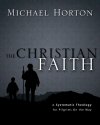
Michael Horton’s highly anticipated The Christian Faith represents his magnum opus and will be viewed as one of—if not—the most important systematic theologies since Louis Berkhof wrote his in 1932. A prolific, award-winning author and theologian, Professor Horton views this volume as “doctrine that can be preached, experienced, and lived, as well as understood, clarified, and articulated.” It is written for a growing cast of pilgrims making their way together and will be especially welcomed by professors, pastors, students, and armchair theologians.
Features of this volume include:
- A brief synopsis of biblical passages that inform a particular doctrine
- Surveys of past and current theologies with contemporary emphasis on exegetical, philosophical, practical, and theological questions
- Substantial interaction with various Christian movements within the Protestant, Catholic, and Orthodoxy traditions, as well as the hermeneutical issues raised by postmodernity
- Charts, sidebars, questions for discussion, and an extensive bibliography, divided into different entry levels and topics
In this impressive volume, Michael Horton . . . remits and rethinks the greatness of seventeenth-century Reformed theology and makes it accessible for readers today.
—George Hunsinger, Professor of Systematic Theology, Princeton Theological Seminary
The Christian Faith is a remarkable accomplishment—the most significant single-volume systematic theology to be written in decades! This book is written for the sake of the church, yet it also reflects a fresh engagement with a broad range of biblical and theological scholarship. The Christian Faith is an excellent resource for all who wish to engage classical Christian theology in a Reformed key.
—J. Todd Billings, Associate Professor, Western Theological Seminary
This is a work of outstanding theological and spiritual cogency and will command wide attention.
—John Webster, Chair of Systematic Theology, King's College, University of Aberdeen
Michael Horton’s awareness of modern theological and philosophical currents combines with his articulate commitment to historical orthodoxy to make this book one of the most significant voices to be heard in framing a systematic theology for this generation of the Reformed movement.
—Bryan Chapell, distinguished professor of preaching, Knox Theological Seminary
Horton’s Christian Faith has the great merit of never letting the reader forget that doctrine is for disciples who want to walk the way of Jesus Christ. Horton knows that the best systematic theology is a practical theology—one that helps us understand the ways of God, make sense of life, and give direction for God-glorifying living.
—Kevin J. Vanhoozer, Professor of Theology, Wheaton College and Graduate School
. . . offers a fine, comprehensive companion to a number of recent systematic theologies. Crisply written, scripturally informed throughout, distinctively evangelical and Reformed, conversant with classic as well as contemporary Christian authors—Horton’s study is an outstanding contribution that will richly nourish Christian pilgrims on their way toward the consummation of Christ’s kingdom.
—Cornelis P. Venema, President, Mid-America Reformed Seminary
A crisp, clear, and forceful new theology that is at once biblical and reverent, historical and contemporary, learned but accessible. What a great gift this is to the church!
—David F. Wells, Distinguished Research Professor, Gordon-Conwell Theological Seminary
Dr. Horton has produced a remarkable work. His approach to systematic theology is fresh and critically needed in our time. Every pilgrim will profit from this work.
—R. C. Sproul, Chairman and President, Ligonier Ministries
Michael S. Horton (PhD, University of Coventry and Wycliffe Hall, Oxford) is J. Gresham Machen Professor of Systematic Theology and Apologetics at Westminster Seminary California. A Reformed minister, he also co-hosts the White Horse Inn and is editor of Modern Reformation magazine. Horton has authored more than twenty books.
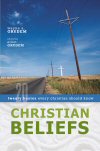
God doesn’t call every Christian to go off to seminary, but there are certain matters of doctrine—that is, the church’s teaching—that every Christian simply must know. Theology is important because what we believe affects how we live. If you’re a relatively new believer in Jesus, or if you’re a more mature Christian looking for a quick brush-up on basics of the faith, Christian Beliefs is for you.
This readable guide to twenty basic Christian beliefs is a condensation of Wayne Grudem’s award-winning book on systematic theology, prized by pastors and teachers everywhere. He and his son, Elliot, have boiled down the essentials of Christian theology for the average layperson and made them both clear and applicable to life. You will learn about the Bible, the characteristics of God, what it means that we are created in the image of God, what God has done for us in Christ, the purpose of the church, and much more. Each chapter includes questions for personal review or group discussion.
These truly are twenty basic beliefs that every Christian should know. Wayne Grudem is a master teacher with the ability to explain profound truths in simple language. He is a man of deep conviction and theological passion—and those who read this book will be both educated and encouraged in the faith.
—R. Albert Mohler Jr., President, The Southern Baptist Theological Seminary
. . . this summary will certainly help beginners with Christ to get the hang of their faith.
—J. I. Packer, Executive Editor, Regent College
As Wayne Grudem's Systematic Theology contracts into a compact book, I do not lose my enthusiasm for the truth he loves and the clarity of his words.
—John Piper, Author and Theologian, Bethlehem Baptist Church
Wayne Grudem is Research Professor of Theology and Biblical Studies at Phoenix Seminary in Phoenix, Arizona. He holds degrees from Harvard (AB), Westminster Theological Seminary (MDiv, DD), and Cambridge (PhD). He is the author of more than a dozen books including the bestselling Systematic Theology.
Elliot Grudem is Senior Minister at Christ the King Presbyterian Church (PCA) in Raleigh, North Carolina.
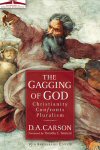
This Gold Medallion Award-winning book presents a persuasive case for Christ as the only way to God. Is Jesus the only way to God? This clear, critically-acclaimed, scholarly response to that question affirms the deep need for the Gospel’s exclusive message in today’s increasingly pluralistic global community. The Gagging of God offers an in-depth look at the big picture, shows how the many ramifications of pluralism are all parts of a whole, and then provides a systematic Christian response.
The Gagging of God is divided into four parts:
- Part One looks at the history of pluralism, especially the revolution in hermeneutics, literary theory, and epistemology.
- Part Two addresses religious pluralism, notably the work of John Hick and David Tracy, and of inclusivists such as Clark Pinnock and John Sanders. It argues for the Bible's foundational "plotline," and addresses the uniqueness of Christ.
- Part Three analyzes the Christian's stance in a pluralistic culture across such diverse fields as education, law, and morals.
- Part Four looks at how pluralism has penetrated the evangelical camp and offers a thoughtful look at how to evangelize in a postmodern generation.
The Gagging of God makes a tremendous contribution . . . highly recommended.
—Evangelical Journal
. . . on the issues of pluralism, postmodernism, and biblical interpretation, it is a splendid resource.
—Patrick Rist, Faculty Commons
D. A. Carson (PhD, University of Cambridge) is Research Professor of New Testament at Trinity Evangelical Divinity School in Deerfield, Illinois. He is the author or coauthor of over fifty books. He is General Editor of Telling the Truth: Evangelizing Postmoderns and Worship by the Book. He has served as a pastor and is an active guest lecturer in church and academic settings around the world.
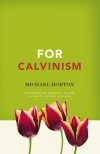
The system of theology known as Calvinism has been immensely influential for the past five hundred years, but it is often encountered negatively as a fatalistic belief system that confines human freedom and renders human action and choice irrelevant. Taking us beyond the caricatures, Michael Horton invites us to explore the teachings of Calvinism, also commonly known as Reformed theology, by showing us how it is biblical and God-centered, leading us to live our lives for the glory of God.
Horton explores the historical roots of Calvinism, walking readers through the distinctive known as the “Five Points,” and encouraging us to consider its rich resources for faith and practice in the twenty-first century. As a companion to Roger Olson’s Against Calvinism, readers will be able to compare contrasting perspectives and form their own opinions on the merits and weaknesses of Calvinism.
Michael S. Horton (PhD, University of Coventry and Wycliffe Hall, Oxford) is the J. Gresham Machen Professor of Systematic Theology and Apologetics at Westminster Seminary California. A Reformed minister, he also co-hosts the White Horse Inn and is editor of Modern Reformation magazine. Horton has authored more than twenty books.
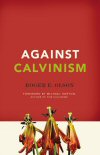
Calvinist theology has been debated and promoted for centuries. But is it a theology that should last? Roger Olson suggests that Calvinism, also commonly known as Reformed theology, holds an unwarranted place in our list of accepted theologies. In Against Calvinism, readers will find scholarly arguments explaining why Calvinist theology is incorrect and how it affects God’s reputation.
Olson draws on a variety of sources, including Scripture, reason, tradition, and experience, to support his critique of Calvinism and the more historically rich, biblically faithful alternative theologies he proposes. Addressing what many evangelical Christians are concerned about today—so-called “new Calvinism,” a movement embraced by a generation labeled as “young, restless, and Reformed”—Against Calvinism is the only book of its kind to offer objections from a non-Calvinist perspective to the current wave of Calvinism among Christian youth. As a companion to Michael Horton’s For Calvinism, readers will be able to compare contrasting perspectives and form their own opinions on the merits and weaknesses of Calvinism.
Roger E. Olson (PhD, Rice University) is Professor of Theology at George W. Truett Theological Seminary of Baylor University. He is the author of many books, including Questions to All Your Answers: The Journey from Folk Religion to Examined Faith, Reformed and Always Reforming: The Postconservative Approach to Evangelical Theology, and How to Be Evangelical without Being Conservative.
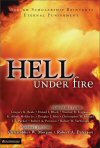
Of all the teachings of Christianity, the doctrine of hell is easily the most troubling, so much so that in recent years the church has been quietly tucking it away. Rarely mentioned anymore in the pulpit, it has faded through disuse among evangelicals and been attacked by liberal theologians. Hell is no longer only the target of those outside the church. Today, a disturbing number of professing Christians question it as well.
Perhaps more than at any other time in history, hell is under fire. The implications of the historic view of hell make the popular alternatives, annihilationism and universalism, seem extremely appealing. But the bottom line is still God’s Word. What does the Old Testament reveal about hell? What does Paul the apostle have to say, or the book of Revelation? Most important, what does Jesus, the ultimate expression of God’s love, teach us about God’s wrath?
Upholding the authority of Scripture, the different authors in Hell under Fire explore a complex topic from various angles. R. Albert Mohler Jr. provides a historical, theological, and cultural overview of “The Disappearance of Hell.” Christopher Morgan draws on the New Testament to offer three pictures of hell as punishment, destruction, and banishment. J. I. Packer compares universalism with the traditional understanding of hell, Morgan does the same with annihilationism, and Sinclair Ferguson considers how the reality of hell ought to influence preaching.
These examples offer some idea of this volume’s scope and thoroughness. Hell may be under fire, but its own flames cannot be quenched by popular opinion. This book helps us gain a biblical perspective on what hell is and why we cannot afford to ignore it. And it offers us a better understanding of the One who longs for all people to escape judgment and obtain eternal life through Jesus Christ.
This collection of essays plumbs the deep things of God with clarity, care, and conviction. We see how God is glorified when truth is put forever on the throne and evil on the scaffold.
—David F. Wells, Andrew Mutch Distinguished Professor of Historical and Systematic Theology, Gordon-Conwell Theological Seminary
One of the strongest and most useful biblical and theological assessments of the doctrine of hell over its ancient and modern detractors. There is hardly anything to match either the scope of its argument or the incisiveness of its thought in the last several decades!
—Walter C. Kaiser Jr., President, Gordon-Conwell Theological Seminary
Hell under Fire confronts the strongest arguments against hell fairly, clearly, and with pastoral sensitivity. The authors refuse even for a moment to beat around the bush with vague platitudes. They return again and again to the deeply disturbing but clear teaching of Scripture that hell does exist, and that it is a place of eternal punishment. This is a sobering, persuasive, much-needed book.
—Wayne Grudem, Research Professor of Bible and Theology, Phoenix Seminary
Christopher W. Morgan is Professor of Theology and Dean of the School of Christian Ministries at California Baptist University in Riverside, California. Author/editor of ten books and a teaching pastor of Helendale Community Church, he and his wife, Shelley, have been married for twenty years and live in Helendale, California.
Robert A. Peterson is Professor of Systematic Theology at Covenant Theological Seminary in St. Louis, Missouri. He is author or editor of twenty books, including Salvation Accomplished by the Son: The Work of Christ and Our Secure Salvation: Preservation and Apostasy.
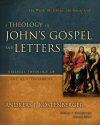
In A Theology of John’s Gospel and Letters, building on many years of research and study in Johannine literature, Andreas Köstenberger not only furnishes an exhaustive theology of John’s Gospel and letters, but also provides a detailed study of major themes and relates them to the Synoptic Gospels and other New Testament books. Readers will gain an in-depth and holistic grasp of Johannine theology in the larger context of the Bible.
. . . for the comprehensiveness of its coverage in the field of Johannine theology (Gospel and Letters), there is nothing to compare to this work.
—D. A. Carson, Research Professor of New Testament, Trinity Evangelical Divinity School
. . . the first major volume to be devoted specifically to the theology of John’s Gospel and Letters at a high academic level; and the first volume to do so on the basis that here we have an interpretation of John’s theology composed by an eyewitness of the life and passion of Jesus.
—I. Howard Marshall, Honorary Research Professor of New Testament, University of Aberdeen
Massive and masterful, [it] presents Johannine theology in encyclopedic fullness . . . a new benchmark in synthetic treatment.
—Robert W. Yarbrough, Professor of New Testament, Covenant Theological Seminary
Andreas Köstenberger is Director of PhD Studies and Professor of New Testament and Biblical Theology at Southeastern Baptist Theological Seminary in Wake Forest, North Carolina. He is the author of numerous works on John, including his commentary in the Baker Exegetical Commentary on the New Testament series, John in Commentary on the New Testament Use of the Old Testament, and John in Zondervan Illustrated Bible Backgrounds Commentary.
Reviews
4 ratings
W Russell Lyle III
10/28/2014
John Garrett Conner
10/24/2013

Robert J Smith
9/22/2013

Steve Fish
8/9/2013